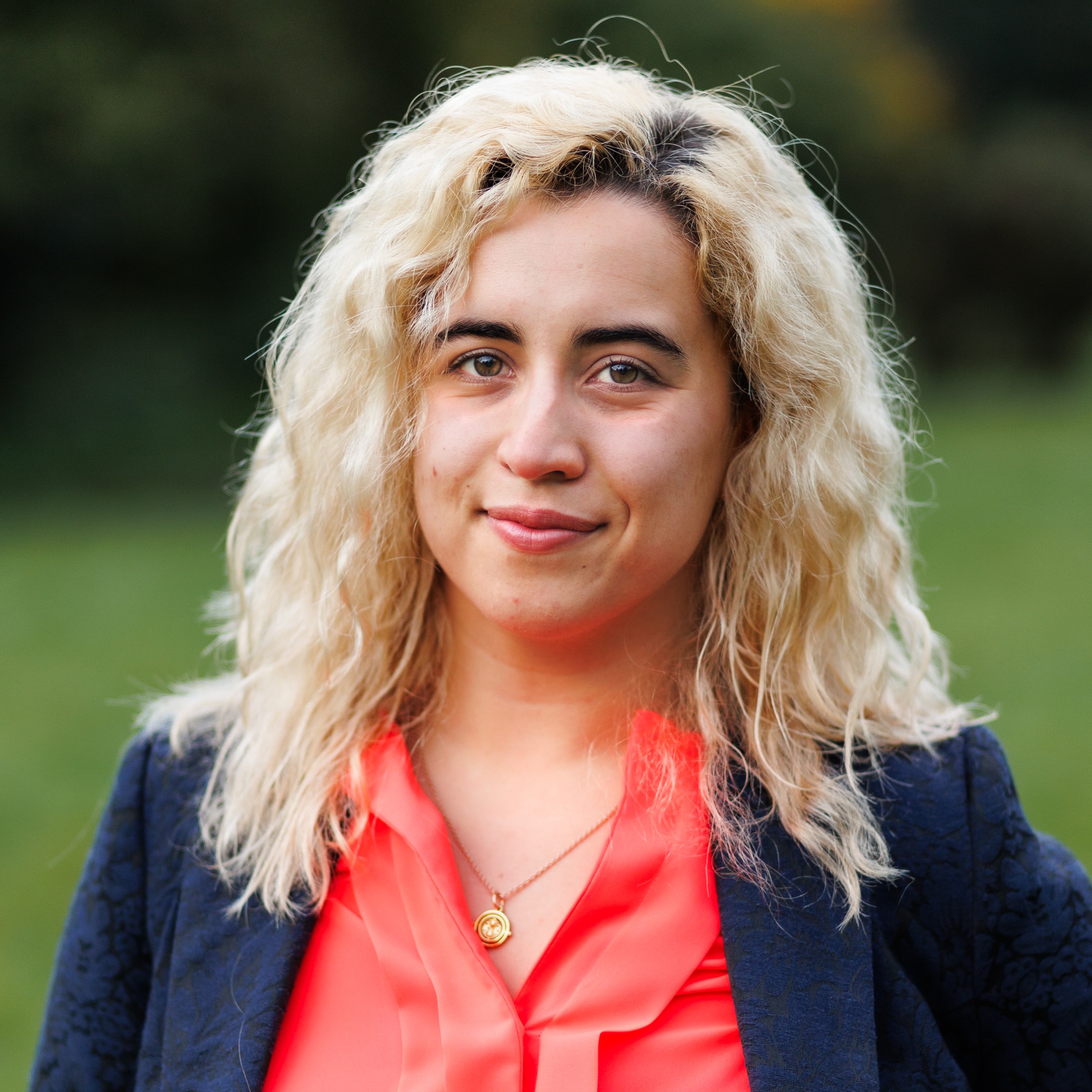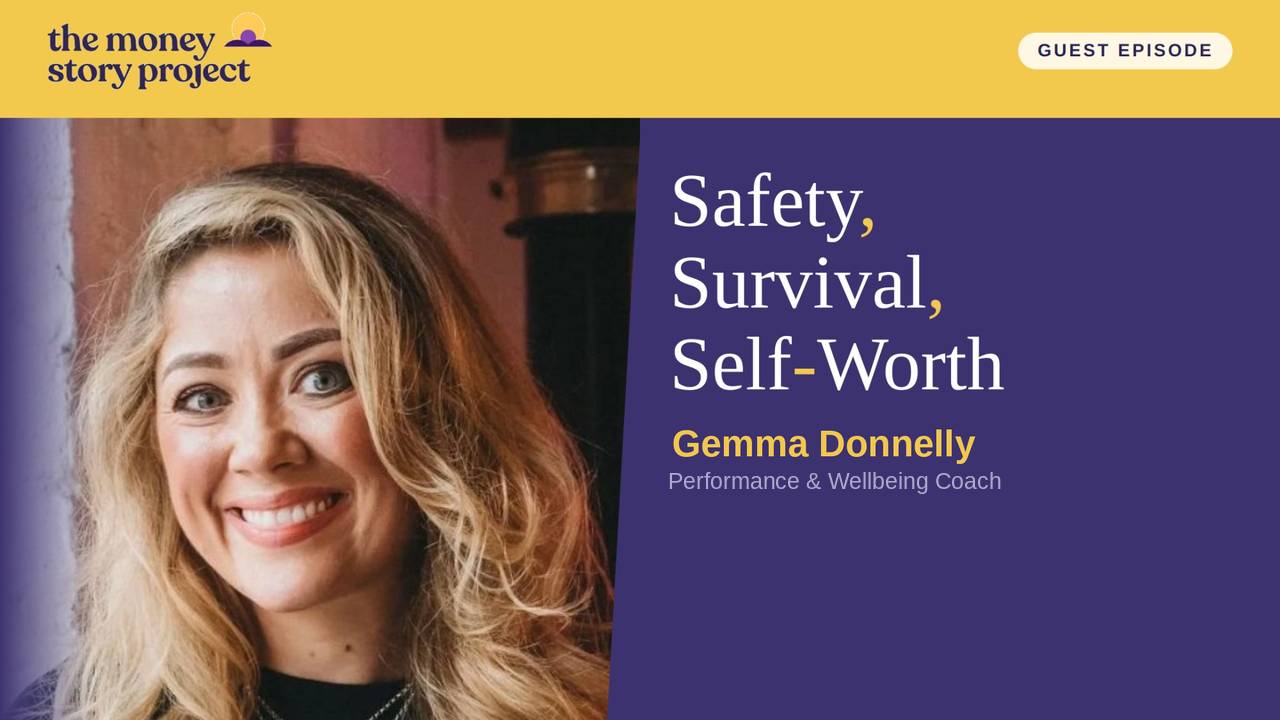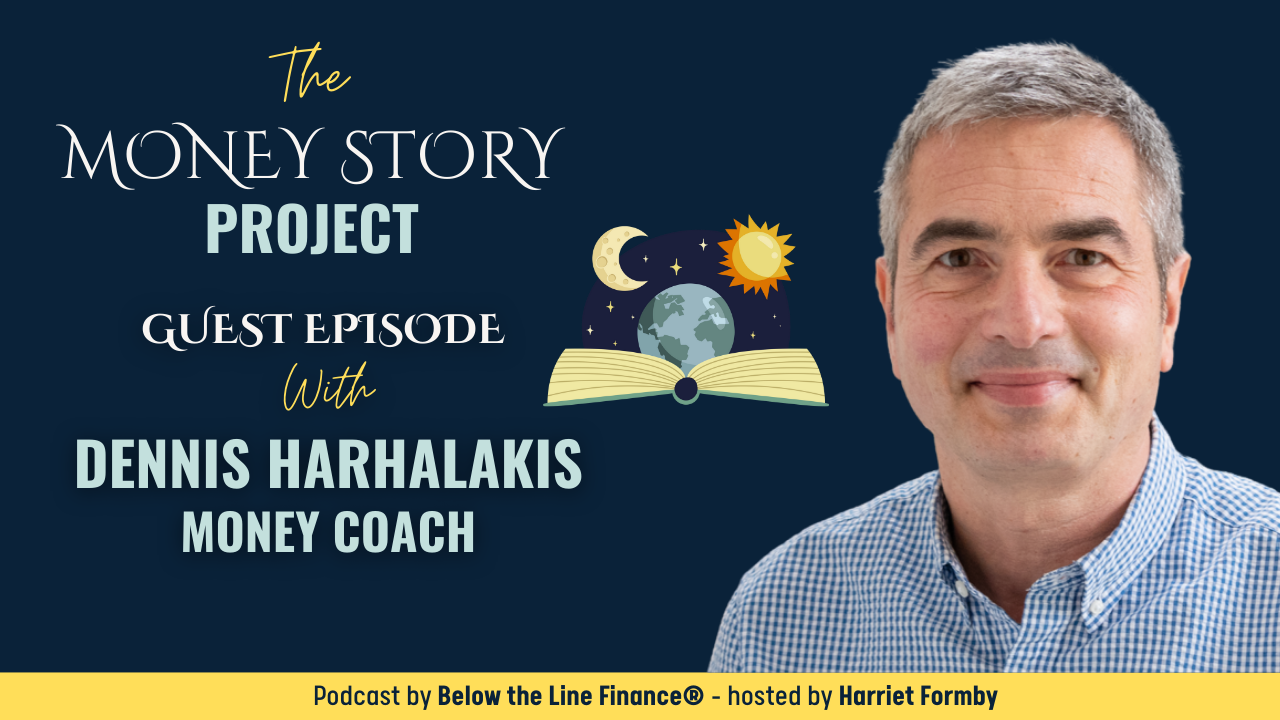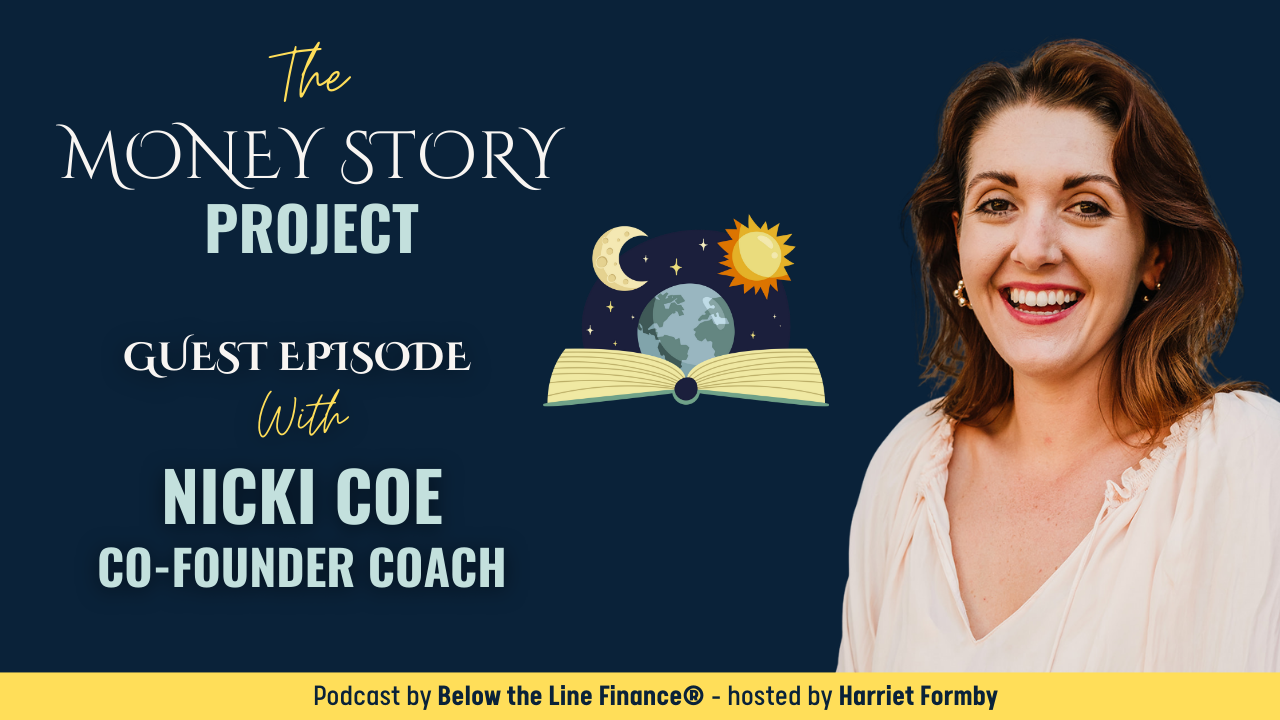Suspicion, Permission & Possibility: A Money Story with Paulina Folaron

Themes: Polish cultural inheritance and historical suspicion · effort ceilings and predetermined paths · belonging, class, and who gets to prosper · brand loyalty as identity (Wild, Apple, cultish communities) · the emotional architecture of money decisions · self-care spending as radical practice · reframing affirmations through questions · permission without apology
From post-communist Poland to permission slips for monthly massages, digital marketing consultant Paulina Folaron maps a money story shaped by historical suspicion, classed belonging, and the slow work of moving her own lines.
The Whoosh Before the Weight
When I ask Paulina Folaron what comes up when she hears the word money, there's an immediate shift in energy.
"There was like a whole whoosh, whoosh, whoosh of energy through me," she says, her voice lifting. "Opportunity, open doors, possibility. It's a feeling of options, a question of how and when, not if."
But then comes the counter-pull: "There's still that 5-10% — that weight, that old story of money doesn't grow on trees, that question of am I deserving enough?"
This is the territory Paulina has been mapping: the space between inherited caution and practiced possibility, between what she was told was available to her and what she's learning to claim anyway.
The Cynicism Is Strong With Us
Paulina's money story doesn't begin with her. It begins with Poland — specifically, with the post-communist era and the early capitalism of the 1990s, when suspicion wasn't paranoia but survival intelligence.
"Generationally, there's this cynicism and distrust of anyone doing significantly better than others," she explains. "In the 70s and 80s, those who had privileges were often informants. That left us with this legacy: you can never trust that abundance is honest."
It's not just folklore. The suspicion had roots in real harm — people who prospered by betraying their communities, who traded information for rations, who played the system while others suffered. That history created a cultural reflex: if someone is doing well, they must be up to no good.
"We still carry this," Paulina says. "The conversation around someone doing better isn't how can I learn from them? or maybe there's room for me too? It's what are they doing that's dodgy?"
The association lingers: wealth means selling out. Money means compromise. Success requires sacrificing your values.
The 100% Ceiling
Alongside suspicion came another inheritance: the idea that hard work has a ceiling, and even hitting that ceiling might not be enough.
"There's only so hard you can work," Paulina says. "100% is the maximum — that's zero to 100, that's it. Unless you're staring headlong into burnout, you can't give 150%. And the idea was, even if you give 100% all the time, what you wish for might still not happen."
She describes growing up with blinkers on — not self-imposed, but held in place by well-meaning adults who genuinely believed they were protecting her from disappointment.
"It felt like the only paths available were the ones I'd already seen people achieve in my closest circles. These are your choices. This is the safer path. Don't step out of line too much."
The message underneath: you're predetermined by where you come from. You don't belong in those other spheres. You don't know the right people. And without connections, certain opportunities simply aren't possible.
"There's this classist split," she reflects. "You feel like you're starting from a losing position."

Photo by: Celie Nigoumi
The Emotional Architecture of Money
For years, Paulina tried to approach money logically — budgets, spreadsheets, cash flow projections.
"I was trying to be very data-driven and detached," she says. "But ultimately, so much of it is wrapped up in emotions. Trying to detach rather than acknowledge it — no wonder it wasn't getting me where I needed to go."
Her shift came when she stopped fighting the emotional dimension and started working with it.
"The truth is, money is something we inherently approach in an emotional way. I honestly believe 80% of our money decisions are totally emotional — whether it's about belonging, survival, fitting in, or whatever survival means through your own upbringing. Only 20% is what we think of as logical."
She's not advocating chaos. She's advocating awareness. The emotions aren't the problem — ignoring them is.
"We can put a guise of logic on things, but the feelings are there. The question is: which emotions do you want to be led by?"
Brand Loyalty, Betrayal, and What We Project
One of the most striking threads in our conversation is Paulina's analysis of how we attach identity to brands — and how betrayed we feel when those brands pivot.
She references Amanda Montell's Cultish and the podcast Sounds Like a Cult, which examine how communities (SoulCycle, MLMs, even Swifties) use language and ritual to create belonging. You're not just buying a product; you're joining a tribe.
When I mention the backlash to Wild deodorant selling to Unilever, Paulina pauses.
"We're calling it a 'sellout.' But do we hold shares in Wild? What's our vested interest that we feel so passionate about it?"
She unpacks the dynamic gently but clearly: we identify our values with brands that reflect them back to us. When those brands change course, we feel a small betrayal — even though we have no actual stake in the business.
"Sometimes the bigger question isn't why did they change? but what am I projecting about what they owe me?"
It's the same pattern she sees in how we judge individuals who achieve financial success.
"If we think money and values are mutually exclusive, then someone charging well for their work feels like evidence they've sold out. But the alternative can't be: I don't sell out and I remain poor."
She's learning to hold both: values and money. Mission and prosperity. It doesn't have to be either/or.
Moving the Line: Self-Spending as Non-Negotiable
One of Paulina's most concrete shifts has been around spending on herself — specifically, around care.
She describes a year when she committed to a monthly massage. It was budgeted. It was intentional. It felt good.
"I promised myself as a CEO that I deserved it. It was in the budget. Emotionally, it felt great. Three pillars aligned."
Then came the reaction from a family member: "Ooh, fancy."
The comment landed like a small betrayal — not because it was cruel, but because it activated something old.
"I felt this childhood echo. That external judgment of what you're spending on yourself. Everything beyond bills and food was coded as extravagant, as 'living well then.'"
But instead of shrinking back, Paulina held her ground. She started conversations. She named the pattern.
"I've consciously decided to move my comfort zone. What I was told were the only necessary spends — bills and food — versus what the adult me has decided is non-negotiable for my wellbeing."
Her examples are deliberately small: an expensive candle once every three months. A solo café lunch once a week.
"If it's in your budget, it's not indulgence. It's care."
She also names the asymmetry many of us feel: spending on courses or training is easy to justify. Spending on rest, pleasure, resourcing? That's where the shame lives.
"That's exactly where I'm practicing the shift."
The Course Trap and the Payment Plan Question
When it comes to professional development, Paulina's position is pragmatic and compassionate.
"Every small business owner will relate to the pull of that course — the promise of the quick fix, the $20 investment that feels safe."
She's not against courses. She's cautious about predatory marketing that plays on isolation, doubt, and scarcity.
"Landing pages can scare people into decisions. There's a fine line between speaking truly to your audience and crossing into fear-based selling."
Her rule for herself: nothing over $50 and she likes to follow the person for months. Then she can write off the investment as a learning experience without financial stress.
She's not interested in blanket rules. She's interested in people making informed, regulated decisions that align with their actual circumstances — not their aspirational ones.
From Affirmations to Questions
We explored the impact of expectations about money outcomes and Paulina shared how classic affirmations never worked for Paulina.
"I'd stand in front of the mirror saying I am abundant, and my brain would just go: here are all the reasons you're not."
Then she encountered Candice Brathwaite's reframe: turn affirmations into questions.
"Instead of I am well, ask why am I well today? Your brain goes: okay, well, I woke up healthy. I've got lunch with a friend. It's sunny. I can do some yoga. You start finding evidence instead of fighting with yourself."
It's a small shift with a different texture. Questions invite answers. Declarations provoke resistance.
"It doesn't have to be such a big thing. Just while your kettle's boiling: why am I feeling good today? Let yourself list the reasons."
If Money Were a Person
I ask Paulina what she'd say to money if it were a person sitting across from her.
She doesn't hesitate: "Come on over. Pull up a pew. Let's chat. Come here. We've got things to do. Let's go."
It's an invitation, not a plea. A conversation, not a confrontation.
"There's so much power there — but not in the way I used to think, where it felt like someone else's power dripping down on me. This power is mine, with what I already have."
She's learning to zoom out more. To hold the big picture alongside the immediate.
"Today is just a blip in the grand scheme. I can forgive myself for spending that $30 on a course I still haven't done. I'm getting wiser."
Where This Leaves Her
Paulina isn't offering closure. The suspicion, the ceiling, the class-based belonging, the friction around self-spending — they're all still present.
What's different is the toolkit: noticing projections instead of absorbing them. Moving the "non-negotiables" line without apology. Replacing hollow declarations with gentle, evidence-seeking questions.
And speaking it out loud. Because when one person names the quiet thing, the rest of us hear the echo — and can start loosening our own grip.
🎧 Listen now to Suspicion, Permission, Possibility 🎧 Or on Spotify or Apple Podcasts
About Paulina Folaron
Paulina Folaron is a digital marketing and operations consultant, solutions specialist, cat mum, and self-proclaimed Kitchen Witch. She helps business owners find method in the madness — turning endless ideas into practical actions for more structure, focus, growth, and ease.
She offers a free instant-access masterclass on Email-First Marketing, exploring why email deserves to sit at the center of your marketing strategy and how to build trust without content burnout.
- Website: Paulina F Solutions
- Free masterclass: Email-First Marketing
- Instagram: @paulinaf_solutions
This conversation is part of The Money Story Project - a storytelling space where we explore what money means, what it's meant, and how we're all learning to carry it differently. If Paulina's story resonated, consider sharing it with someone who might need to hear it too.
Photo Credit:








